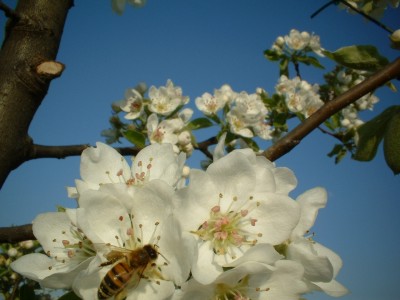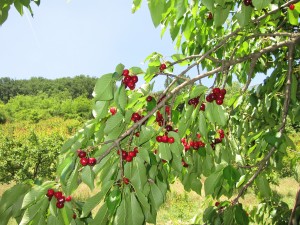The Prunotto Mariangela organic farm, based in Alba, “capital” of the Langhe hill, for over 20 years cultivate his land by the method of Organic Farming and assisted in the production and control of AIAB / ICEA, famous and seriously certifying body.
Our organic, sustainable farming is a method of production that utilizes techniques compatible with environmental conservation and food safety through the use of natural pesticides and fertilizers, as well as the agronomic control of the entire production process. As a result, the final product is naturally delicious and free of any residual synthetic pesticides or chemicals.
Since its constitution, in the orchard are used as a plant more resistant to pests, treating them during the year with targeted interventions that determine the numerical detection of parasites captured with appropriate traps installed by technicians in cultivation. This method adoptable with the support of technicians and facilities for both climate monitoring and fitoiatrico, has allowed us to eliminate the traditional chemical fertilizers, allowing you to drastically reduce the toxic residue on fruit ripening.
It exploits the natural fertility of the soil by favoring the crop rotation (so you avoid growing the same crop on the same land for several productio n cycles in order to make more rational and less intensive nutrients of the soil), fertilization is done for over a decade with only humus (a substance that is derived from a process of decomposition and reworking all natural whose leading proponents are the earthworms). This can be almost immediately available on the ground and allowed us to eliminate all the fertilizers of chemical origin. Beyond that is regularly made that are incorporated green manure plants specially planted in the ground, such as clover or mustard or rapeseed that enrich the soil.
n cycles in order to make more rational and less intensive nutrients of the soil), fertilization is done for over a decade with only humus (a substance that is derived from a process of decomposition and reworking all natural whose leading proponents are the earthworms). This can be almost immediately available on the ground and allowed us to eliminate all the fertilizers of chemical origin. Beyond that is regularly made that are incorporated green manure plants specially planted in the ground, such as clover or mustard or rapeseed that enrich the soil.
In case of necessity, for crop protection substances is done strictly with natural: extracts of plants, beneficial insects that prey on parasites, natural mineral or rock flour to correct structure and chemical characteristics of soil and to protect crops from cryptogams.
When you need to intervene to defend the crops from pests and other adverse use is made only to natural substances expressly authorized by a rigorous and detailed European regulation.
Also we do not use herbicides absolutely, in fact, weeds are controlled or the “chopping” of the same or the mulch under the plants on the row which also has benign effects on the growth of the roots of the plant itself.
The collection of fruits and vegetables is always made by hand and for some cultures in several stages on different days in order to pick the right product at the right point of maturity.
Underlying Sustainable Organic Agriculture is the so-called rotation.
The rotation begins with the sowing of alfalfa that is used as accumulative nitrogen. We then proceed with planting and harvesting wheat, is spread as manure from stables and sown faba beans with which you will do the green manure. Then after at least 3 years are planted specialty crops such as vegetables and tomatoes. The following year the rotation will begin again in different years sowing corn, sorghum or legumes.
The positive effect of this rotation is seen especially on tomato plants and vegetables that grow healthy and strong, because the plants come back on the same ground only after 3/4 years. In this period, since the host plant is not present in the field, also disappear the specific diseases and legumes enrich the soil of nitrogen, thus providing nutrition to the next crop.
To crop rotation and methods careful and delicate machining of the fields, flank the fertilization with the humus which is a further and important expedient for maximum soil fertility. Of fundamental importance is proper fertilization with organic material and the planting of leguminous plants, which grow well during the mild winters, and are buried in the spring.
Organic farming is a production method defined and regulated at Community level by Regulation EC 834/07, and the Implementing Regulation EC 889/08, and at national level by the DM 220/95.
Regarding the field of crops, the most notable features are:
- Maintenance of soil fertility
- Crop rotation
- Green manure crops
- Prevention of erosion
- Rational use of water resources
- Maintenance and promotion of biodiversity
- Ban on use of material from Genetically Modified Organisms
The positive aspects concerning food safety and quality of the final product are linked to:
- Certainty the origin of production
- Significant reduction in residues of synthetic chemicals
- Guarantee the freshness of products
This method of farming exploits the natural fertility of the soil by rotating crops (because growing the same crop on the same land for several production cycles depletes the soil of its natural nutrients). We employ a traditional method of crop rotation in which we replenish the soil’s nitrogen through the use of green manure in sequence with cereals, legumes, and other crops.
Green manure is a type of cover crop grown primarily to add nutrients and organic matter to the soil. C
rop rotation also prevents the build-up of diseases and pests that often occurs when one species is continuously planted in the same field.
This rotation has a remarkable effect on our specialty products.
The result is the healthiest fruit and with distinct nutritional characteristics, ideal for a transformation of higher quality.




